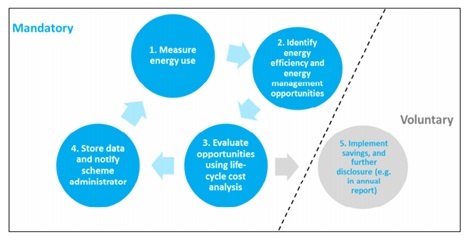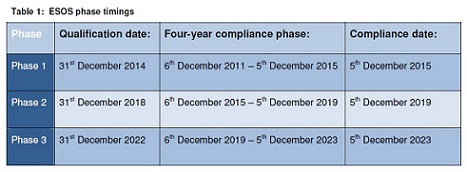December marks qualification date for mandatory energy audits
 Communications
·
2 minute read
Communications
·
2 minute read
This month heralds the arrival of the qualification date for mandatory energy audits for large businesses across the UK.
Businesses that have 250 employees and/or a turnover of €50m on 31 December 2014 will now fall within the scope of the Energy Savings Opportunity Scheme (ESOS).
ESOS requires big businesses to measure their total energy consumption, conduct energy audits to identify cost-effective energy efficiency recommendations and report compliance to the Environment Agency.
 **
**
The compulsory energy audits required under ESOS mean huge opportunities to make efficiencies that will help big organisations to create operational savings, stand out in the tendering process, and help reduce the nation’s carbon footprint.
Energy Management Systems (EnMS), like those outlined by the international standard ISO 50001, help organisations comply with the new energy audit laws and to take measurable steps towards reducing wastage of power and fuel, saving on operational costs, and demonstrating to auditors that they have implemented measurable energy efficiencies.
It is unlikely that companies registered to ISO 50001 by a UKAS accredited certification body will not automatically comply with the requirements of ESOS.
Well-known brands in the automobile, water and drinks industries have already been proactive in seeking training in EnMS and ISO 50001 with the Scottish Quality Management Centre (SQMC), one of Europe’s leading providers of internationally-accredited Quality Management Systems qualifications.
Ron Rivans, technical director at SQMC, explained that ISO 50001 is extremely beneficial to larger organisations now obliged to undergo statutory energy audits.
“In light of more stringent energy targets set across the UK and Europe ISO 50001 is an excellent tool that helps companies manage their energy performance and comply with ESOS legislation
“The nearly five million private sector SMEs across the UK are also encouraged to strive to make energy savings and efficiencies, although they’re not legally required to do so.
“The audits will also allow organisations and individuals help mitigate against the need to buy pricey energy from outside the UK as a result of predicted imminent energy shortages in the next four to five years."
SQMC provides in-house bespoke EnMS training to organisations across the UK, including ISO 50001 Awareness and ISO 50001 Internal Auditor.
About ESOS:
ESOS was established by the Department of Energy & Climate Change to implement Article 8 of the EU Energy Efficiency Directive (2012/27/EU), which aims to reduce the EU’s energy consumption by 20% by 2020. All 27 EU members have signed up for the scheme.
About IS0 50001:
ISO 50001 supports organisations in all sectors to use energy more efficiently through the development of an energy management system (EnMS).
It is based on the management system model of continual improvement also used for other well-known standards such as ISO 9001 and ISO 14001. This makes it easier for organisations to integrate energy management into their overall efforts to improve quality and environmental management.
ISO 50001:2011 provides a framework of requirements for organisations to:
- Develop a policy for more efficient use of energy
- Fix targets and objectives to meet the policy
- Use data to better understand and make decisions about energy use
- Measure the results
- Review how well the policy works, and
- Continually improve energy management.
ESOS Scheme timings
 **
**
** Both tables are from the Department of Energy & Climate Change's Energy Savings Opportunity Scheme (ESOS): A Guide to ESOS, Version 1.1, September 2014


